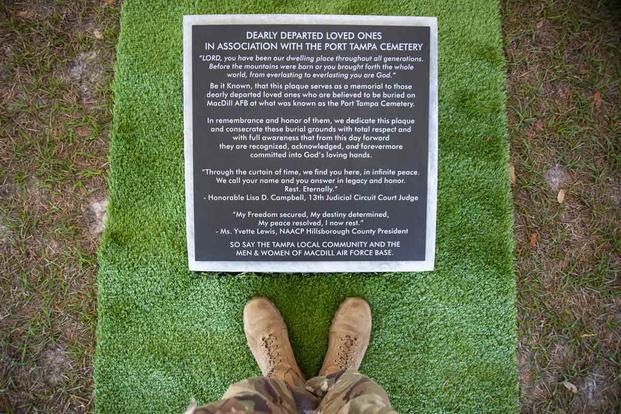Officials at MacDill Air Force Base say 121 potential graves from a historic Black cemetery were located on the installation during a two-year archaeological survey -- and it's likely that more could still be discovered.
The Florida base confirmed in a statement late last week that it had located the unmarked Port Tampa Cemetery, which dates back to the late 1800s and early 1900s.
"In 2022 and 2023, MacDill officials conducted a non-intrusive archaeological survey that identified multiple anomalies including 58 probable graves and 63 possible graves located in an area that had been previously identified as a possible location for an African American cemetery," the 6th Air Refueling Wing, which is based at MacDill, said in a statement.
Read Next: Is the Marine Corps Becoming 'Animal House'?
Second Lt. Laura Anderson, a public affairs officer with MacDill, told Military.com on Monday that they utilized radar, dogs and a variety of historic records to identify the possible grave sites.
The finding of the dozens of possible grave sites is a major revelation and shows the length of the investigation and research taken on since 2019, when the Tampa Bay History Center notified Air Force officials that it was likely a cemetery was located on the grounds near the base's Tanker Way Gate.
In 2021, a memorial plaque and a historical marker were placed at the base, and a service was held to commemorate the Black community members who were buried there.
"The Port Tampa Cemetery was where many African American families of the area laid their loved ones to rest," the historic marker reads. "The segregation-era burial ground was in use by members of the community that did not have the means to use established formal cemeteries."
The town of Port Tampa City dates back to 1885, and a 1935 Works Progress Administration Veterans Administration Graves Registration Book stated that a cemetery was on the east side of the city in the early part of the 20th century, according to the historical marker.
"While the cemetery was not registered, secondary sources showed an unregistered cemetery existed until the 1930s, within the boundary of what is now MacDill Air Force Base," the marker reads. "Upon discovery of the registration book by the Tampa Bay History Center, the installation commander ordered a comprehensive study of the probable location to determine if human remains were present."
MacDill, then an Army Air Base, was activated in 1941, according to the installation's website, and was focused on training soldiers to fly the B-17 Flying Fortress and B-26 Marauder.
Yvette Lewis, president of the NAACP's Hillsborough County branch, told WFTS-TV, the local ABC news station, that the base should recognize the wrongs done to the community in the past.
"No one is saying the current administration or the current people living had a hand in it, but they do have a hand in correcting the wrong," Lewis told WFTS-TV. "They do have a hand in having the conversation and talking about it and telling the story and making sure the story is told correct and properly. They do have a hand in memorializing it."
Anderson told Military.com that more research and surveys will be conducted this year north of the base, and the results should be revealed in mid-2025.
"MacDill officials will continue to work with the community to determine how best to document the history of the site and manage it in a manner that pays respect to the families and their loved ones buried there," the base said in a statement.











